1930s
I’m Going to Give It to Mary with Love
Here's a new cover version of a song once banned by the BBC for lewdness.
Posted By: Paul - Wed Dec 02, 2020 -
Comments (0)
Category: Innuendo, Double Entendres, Symbolism, Nudge-Nudge-Wink-Wink and Subliminal Messages, Music, 1930s
Corkhill Meat Loaf Monster
Was Corkhill's spokes-creature supposed to be a snowman, or some kind of living, talking meatloaf? The body seems all wrong for a snowman. So I have a suspicion it was a meatloaf monster.
Wilmington News Journal - Aug 4, 1939
Posted By: Alex - Fri Nov 13, 2020 -
Comments (2)
Category: Corporate Mascots, Icons and Spokesbeings, 1930s
The Spare Tire Cover as Advertising Medium
The earliest surviving instances of this mode of advertising seem to be really rare. If any WU-vie can find more examples, that would be great!Of course, nowadays you can have custom-designed spare tire covers at the drop of a hat!
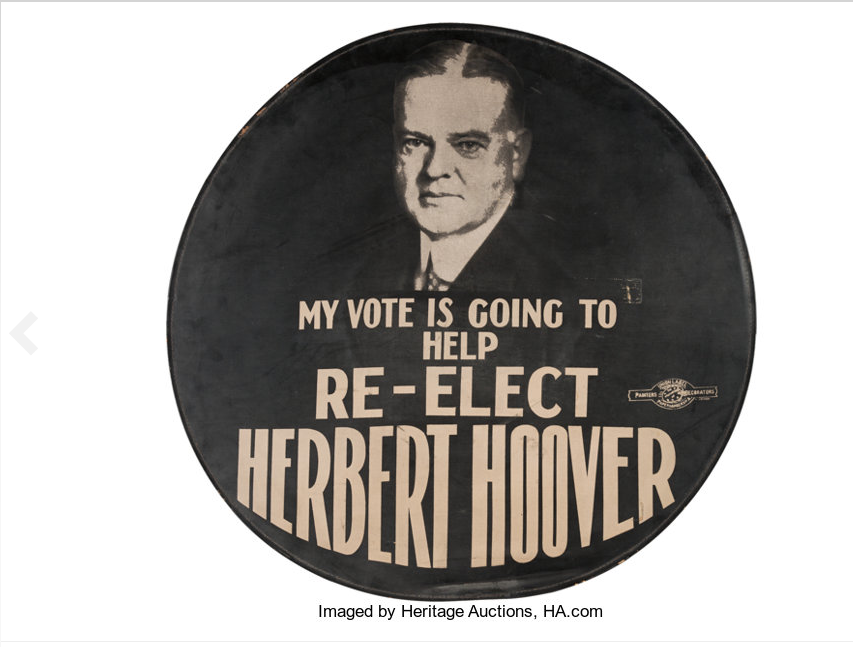
Source.
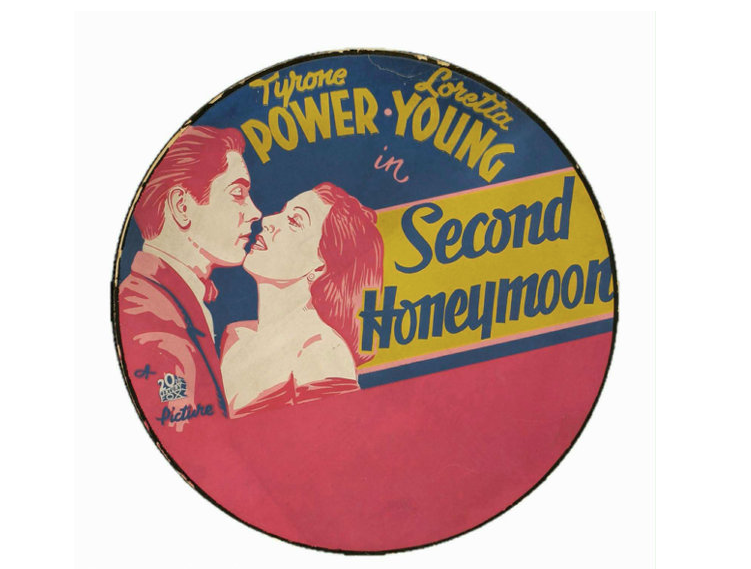
Second Honeymoon (20th Century Fox, 1937). Spare Tire Cover. Throughout the thirties the studios would offer in their pressbooks what were spare tire covers that would advertise their upcoming feature. This silkscreen cover for the Tyrone Power and Loretta Young romance has elastic bands in back which allow it slip right over the tire that was always visible on the back of the automobiles of that time. Probably the theater owner, ushers, or cab companies would be paid to use these. Very interesting novelty that are often seen in pressbooks but few have survived.
Source.
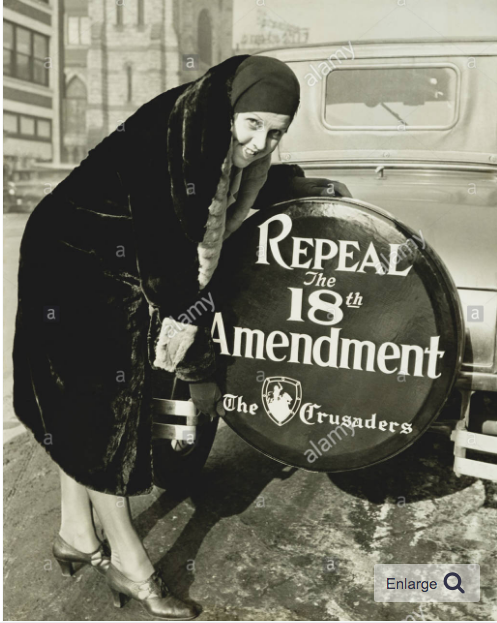
Source.
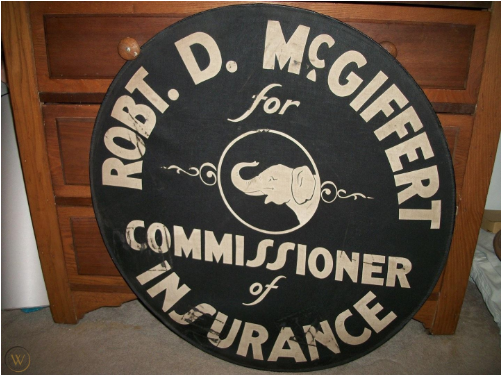
Source.
Posted By: Paul - Thu Nov 05, 2020 -
Comments (3)
Category: Advertising, 1930s, Cars
Court refuses one-cent suit
October 1939: The Supreme Court refused to hear the case of C. Leon De Aryan, thereby ending his legal campaign to recover the one cent of sales tax he believed he had been incorrectly charged.Actually, it was worse than that. The actual amount of the excess charge in question was closer to one-half a cent. De Aryan had bought 15 cents worth of cardboard, and had been charged one cent of sales tax on this purchase. He noted that the tax was three percent. Therefore, he should only have been charged approximately one-half cent of tax, but the retailer rounded up.
I'm guessing De Aryan spent a lot more than one cent in court costs.

San Pedro News-Pilot - Oct 9, 1939
This recalls the 1979 case of Frank Makara who felt he had been overcharged $1.95 at the gas station and took his case all the way to the Supreme Court — which then refused to hear it, as it did with De Aryan's case.
Posted By: Alex - Wed Nov 04, 2020 -
Comments (5)
Category: Lawsuits, 1930s
Horrific Halloween 2020!
Posted By: Paul - Sat Oct 31, 2020 -
Comments (0)
Category: Holidays, Horror, Music, Supernatural, Occult, Paranormal, Superstition, 1930s, Fictional Monsters
Roy Mack’s milk-diet tour
Roy Mack set off from New York on May 2, 1939, intending to walk to San Francisco. To make this more of a challenge, he decided to do this while living on a diet of only milk — about six quarts of it a day. He said he wanted to "prove you can live on milk." The media dubbed him the "human milk bottle."By August he had reached Oklahoma City and had also lost 10 pounds in weight. He maintained this was due to all the exercise, not his milk diet.
I have no idea if he ever did reach San Francisco, because I can't find any news reports about him after Oklahoma City. Perhaps the milk diet got the better of him.

Pittsburgh Press - June 3, 1939
Posted By: Alex - Fri Oct 30, 2020 -
Comments (0)
Category: Food, Publicity Stunts, Travel, 1930s, Dieting and Weight Loss
Laboratory Land
At a 1932 meeting of the British Association, scientist Miles Walker proposed the creation of a colony, initially to consist of 100,000 people, that would be entirely "under the auspices of engineers, scientists and economists." He suggested that it might be located somewhere in North America, or perhaps France. And he figured that the colony would be so successful that it could eventually be expanded to include the entire world.Walker didn't offer a name for his new colony, but the media dubbed it "Laboratory Land." More details from New Scientist (Aug 25, 1983):
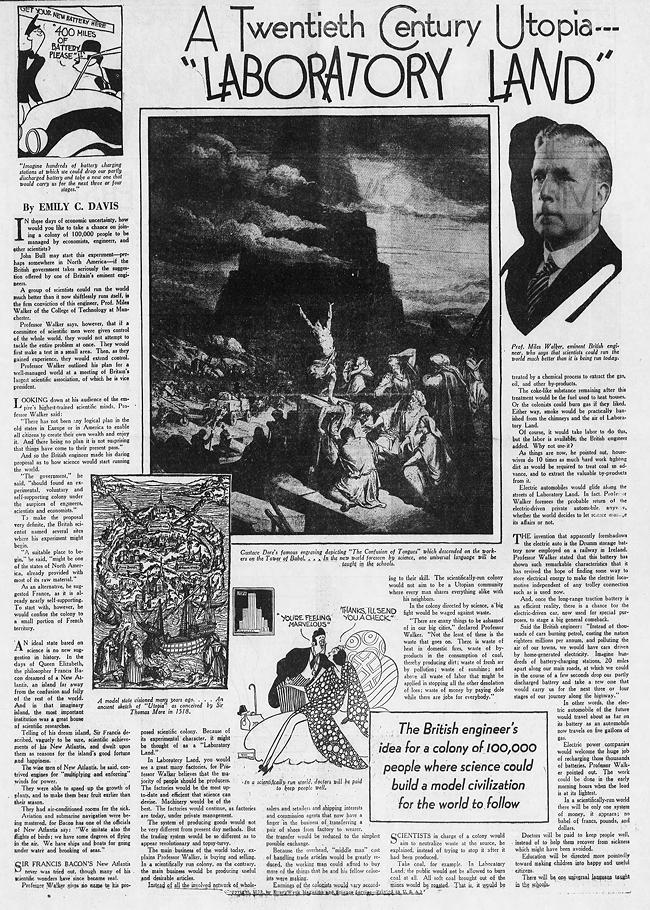
Santa Cruz Evening News - Apr 1, 1933 (click to enlarge)
The key to the success of the colony, he believed, would be its efficiency and elimination of waste. Interestingly, one of the things he had in mind that would allow this efficiency was electric cars:
Almost 100 years later, and we're slowly working our way toward Walker's vision. At least, we are here in California where, by 2035, all new cars will have to be emission-free.
Posted By: Alex - Tue Oct 20, 2020 -
Comments (6)
Category: Utopias and Dystopias, 1930s, Yesterday’s Tomorrows
The 1932 Helicron
Propellor-driven car.Read about it here.
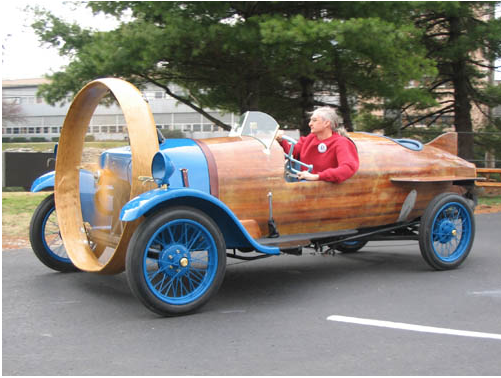
Posted By: Paul - Mon Oct 05, 2020 -
Comments (3)
Category: Inventions, Air Travel and Airlines, 1930s, Cars
Jewell Bell, Three-time Widow at Twenty

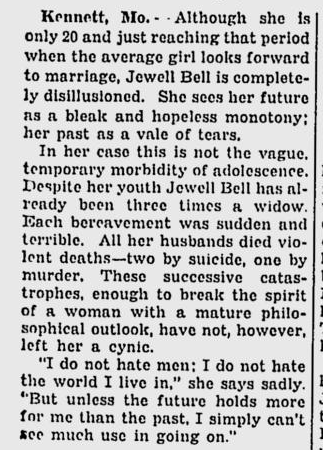
I am reminded of the famous Oscar Wilde quote:
To lose one parent may be regarded as a misfortune; to lose both looks like carelessness.
Posted By: Paul - Thu Oct 01, 2020 -
Comments (0)
Category: Death, Suicide, Husbands, 1930s
The Sleepwalking Bandsman
— Hilary Evans, "The Sleepwalking Bandsman," The Skeptic, 16(2), Winter 2004.
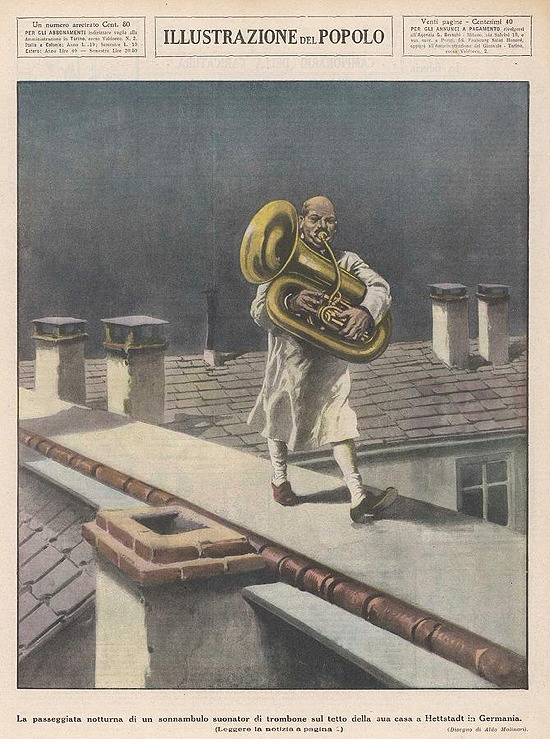
The nighttime walk of a sleepwalking trombone player on the roof of his house in Hettstadt, Germany.
Posted By: Alex - Sat Sep 26, 2020 -
Comments (3)
Category: Sleep and Dreams, 1930s

| Who We Are |
|---|
| Alex Boese Alex is the creator and curator of the Museum of Hoaxes. He's also the author of various weird, non-fiction, science-themed books such as Elephants on Acid and Psychedelic Apes. Paul Di Filippo Paul has been paid to put weird ideas into fictional form for over thirty years, in his career as a noted science fiction writer. He has recently begun blogging on many curious topics with three fellow writers at The Inferior 4+1. Contact Us |




